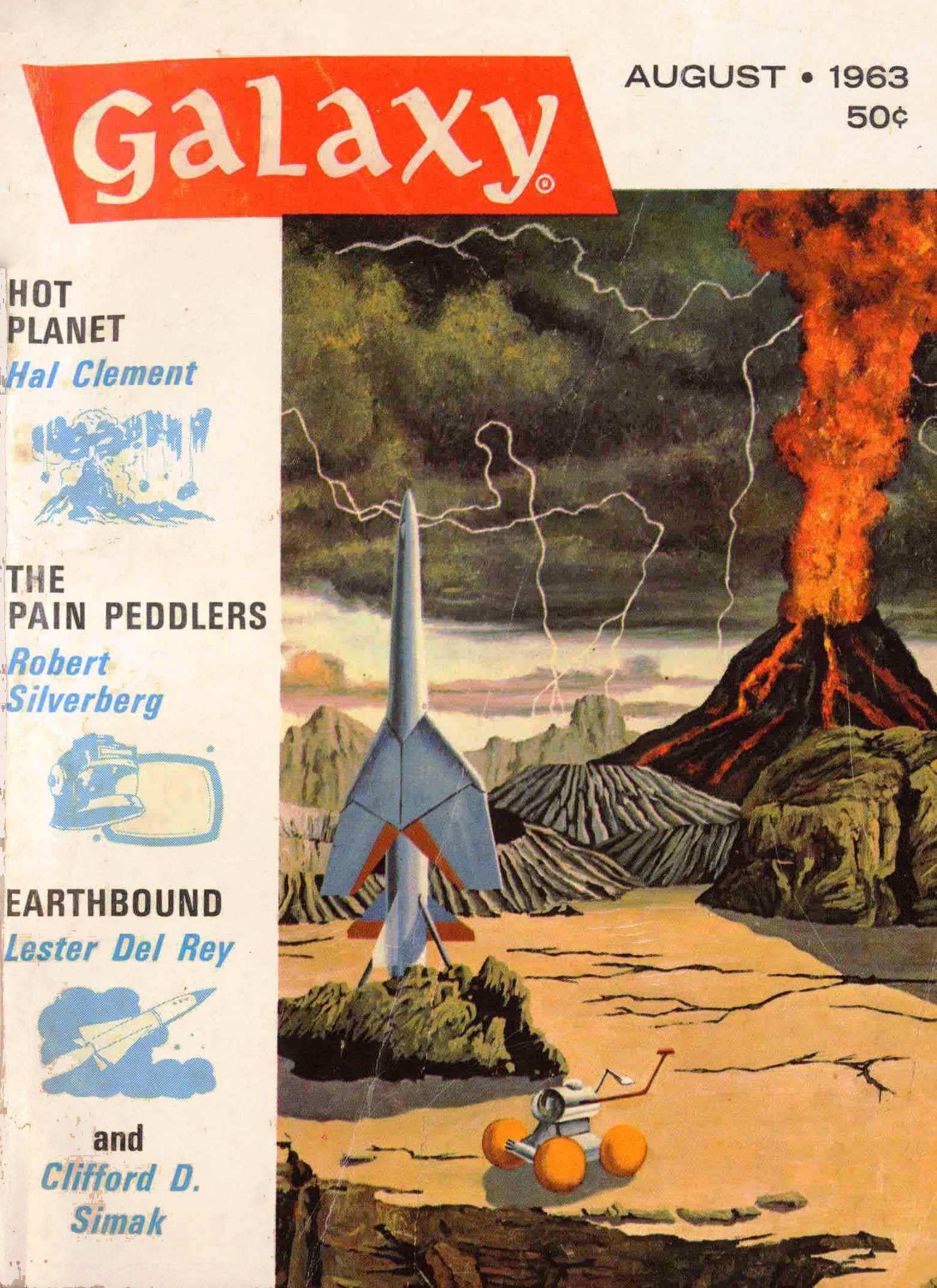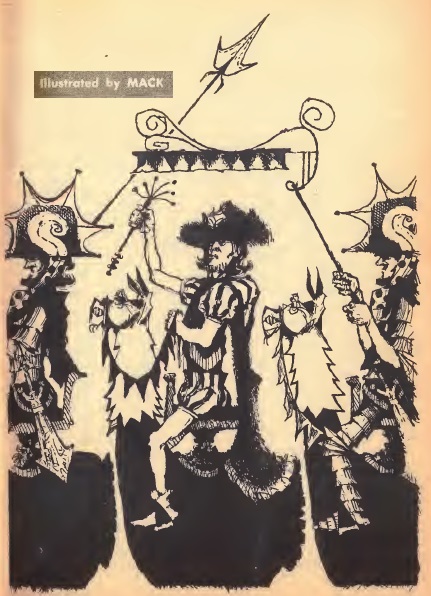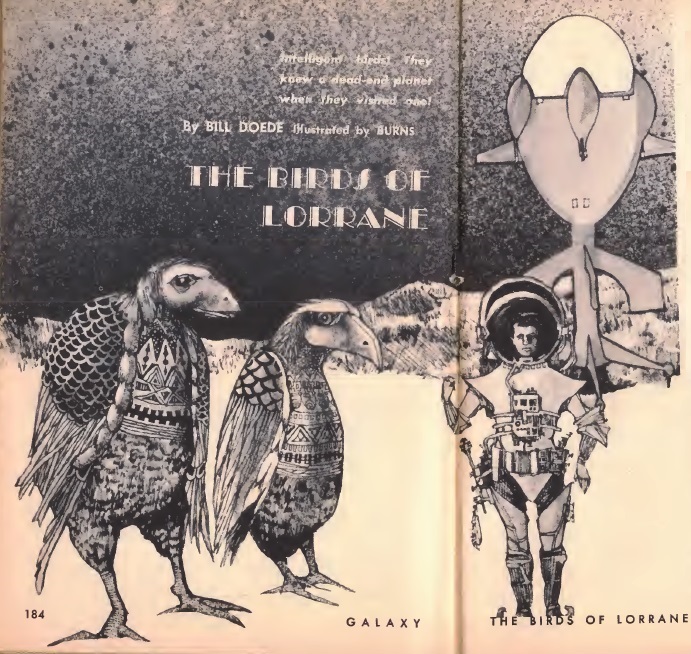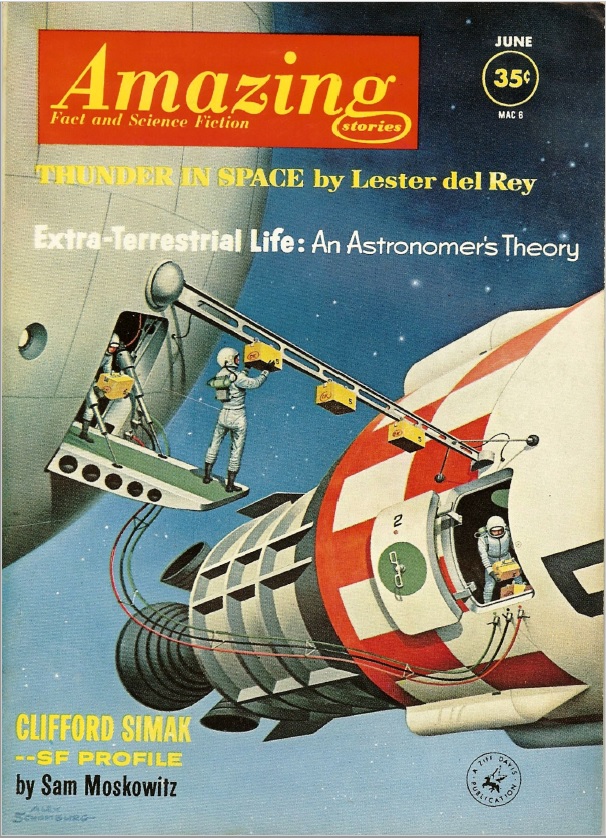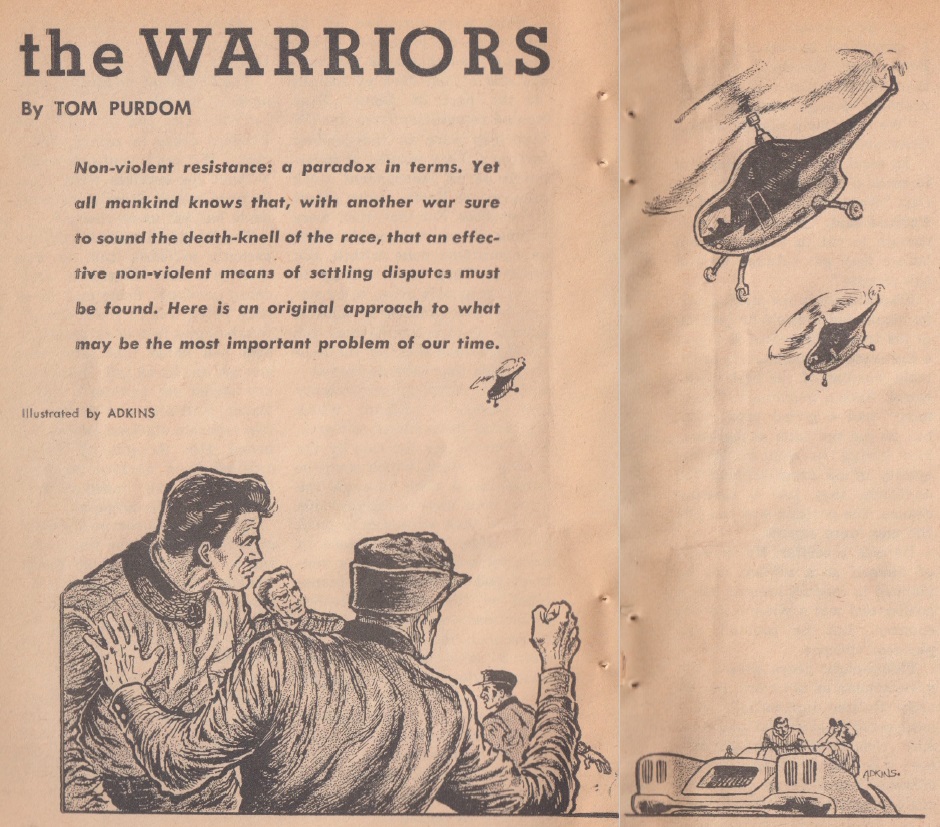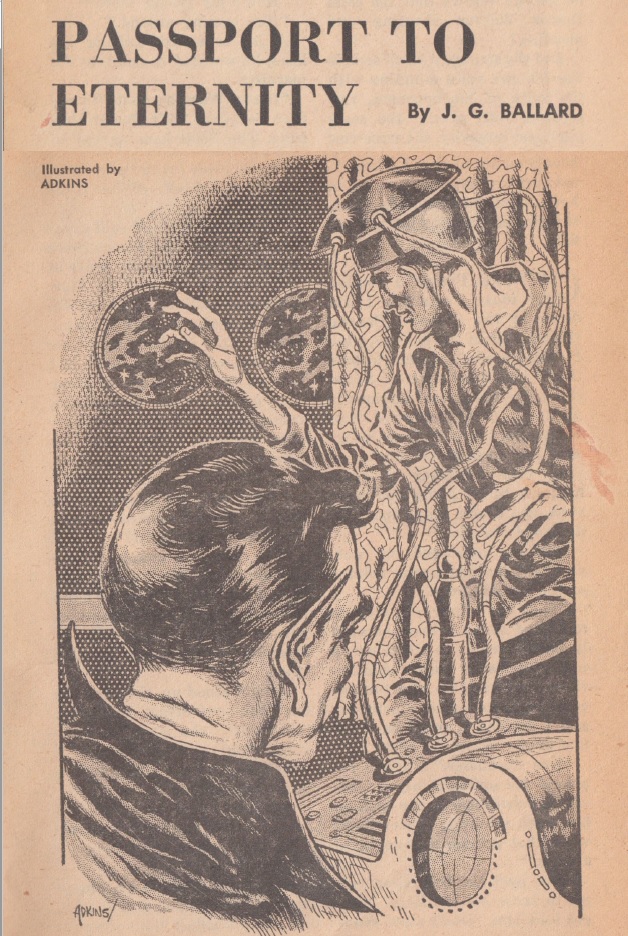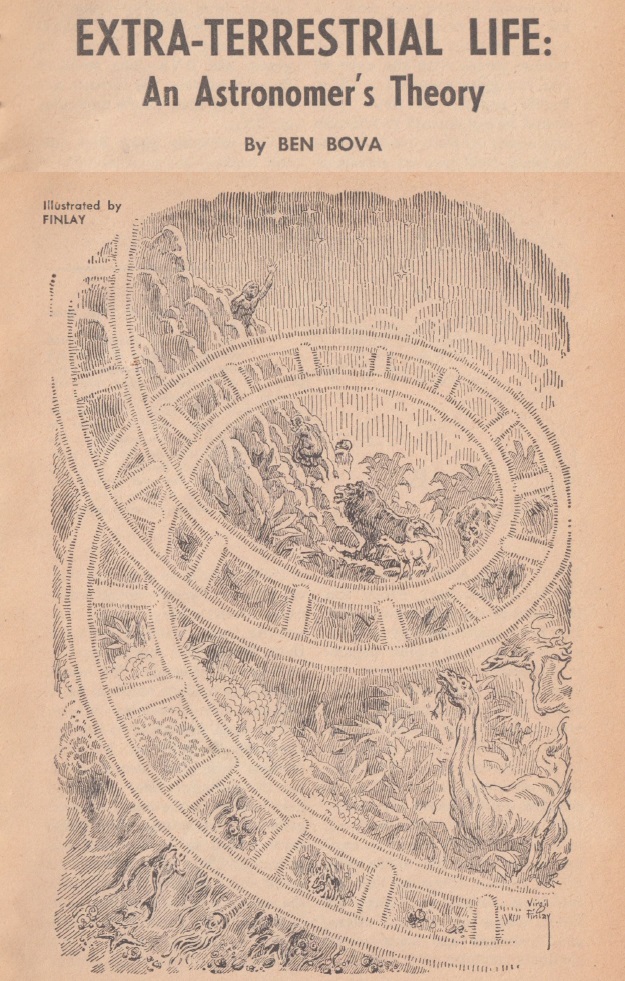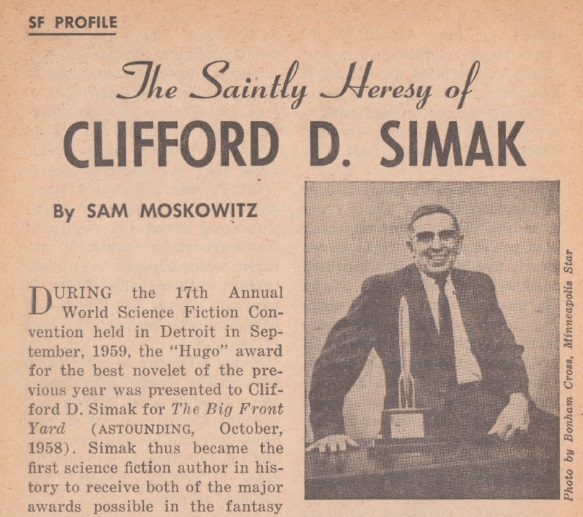
by John Boston

Cover by EMSH
The March 1964 Amazing fairly shouts mediocrity, or worse, before one reads a word of the fiction. The cover, illustrating Robert F. Young’s story Arena of Decisions, portrays a guy working some sort of keyboard in front of video screens displaying . . . a young woman, a lady as some would have it, and a tiger. Can it be that Young, having rehashed the Old Testament and moved on to Jack and the Beanstalk, is now recapitulating that silly old Frank Stockton story, The Lady or the Tiger, which so many of us were forced to read in junior high? And just for lagniappe, the editorial says in passing, “For the female of the sf species who may not be quite sure of her facts, billiards is played with balls and a cue on a flat rectangular table with pockets in each corner and at the middle of the two longer sides.” Always glad to help you ignorant . . . ladies . . . out!
Arena of Decisions, by Robert F. Young

That leads us to page 7, where the Young story begins, and yep, the blurb cops to the Frank Stockton replay right up front. For anyone who hasn’t read or been told the original story, it involves a criminal justice system (if that’s the right word) in which those accused of serious crimes are forced to choose one of two doors to open. Behind one of them is a hungry tiger; behind the other, a woman whom the no-longer-accused is required to marry. The story ends just before the fatal choice, with an element of possible skulduggery added.
Young does not entirely recapitulate Stockton’s plot, but the gimmick is the same, with extra chicanery added, set on a cartoonish colony planet, all told in a style of arch jocularity that mainly conveys the message “I know I’m wasting your time with this facile and vacant crap—let’s see how long I can keep you going.”
I’m about as tired of slagging Young month after month as I am of reading him. I didn’t think he was always this bad, so I reread a couple of his early stories in anthologies: Jungle Doctor from Startling Stories in 1955 and The Garden in the Forest from Astounding in 1953. He wasn’t this bad. These are not great stories—his weaknesses for cliche and sentimentality are evident—but they are reasonably intelligent and capable, if less polished than his current output, with some interesting substance to them rather than the cynical vacuity of Arena of Decisions and its ilk. I would never have called Young mighty, but . . . how the respectable have fallen. One star.
Now Is Forever, by Dobbin Thorpe

Like a breath of fresh breeze in a fetid dungeon, or a slug of Pepto-Bismol to the dyspeptic stomach, comes Now Is Forever by Dobbin Thorpe, reliably reported to be Thomas M. Disch. Intentionally or not, Forever is a rejoinder to Ralph Williams’s clever but facile Business as Usual, During Alterations, which appeared in Astounding in 1958. In Williams’s story, portable matter duplicators suddenly appear on Earth, planted no doubt by aliens bent on conquest by destroying our economy, and the heroic store manager instantly sorts out the new economy: starting now, everything is done on credit, but everybody can have credit. Nothing up my sleeve! Everybody wins!
Disch starts with the same notion but is of course less sanguine. He asks what people will live for when the getting-and-spending basis of their lives is suddenly yanked from under them. The answer is the old and established will cling fiercely and futilely to their old habits, and young people will seek thrills—including death, which is no big deal as long as you duplicate yourself beforehand. This sharply written and well visualized story just misses excellence by being a little too long and rambling for its point. Three stars.
Jam for Christmas, Vance Simonds

It’s back downhill with Vance Simonds’s Jam for Christmas, the second story about Everett O’Toole, the “telempathist,” who with the aid of a mutant mongoose and a worldwide psionic network of other humans and animals, can scan the world to see how people are feeling about things. In this case the world is the Moon, where the now-amalgamated capitalist nations are about to broadcast to Earth the equivalent of a USO show, and the now-amalgamated commies want to jam this display of the vitality of capitalism. (The commies haven’t quite got the know-how to do their own broadcasts.)
Like its predecessor Telempathy, from last June’s issue, the story is swaddled in layers of satirical performance, much of it focusing on O’Toole’s excessive weight and alcohol consumption, the physical attributes of the show’s star, this year’s Miss Heavenly Body, and other cheap targets. Some of it is actually pretty funny—while the telempathists are scanning their own area for communist spies, they come upon a covert fascist whose attitude is concisely lampooned—but it mainly serves to pad out what is ultimately a pretty thin and humdrum story. Two stars.
Sunburst (Part 1 of 3), by Phyllis Gotlieb

That’s all the fiction that is complete in this issue. The longest item is the first installment of Sunburst, a serial by Phyllis Gotlieb, who has had a handful of stories in these Ziff-Davis magazines and in If. I usually hold off on serials until all the parts are in, but in my weary quest for something more to redeem this lackluster issue, I read this installment. The set-up is interesting: in a small midwestern town, a nuclear reactor explosion has resulted in the birth of a cohort of psi-talented mutants, who come into their powers as children and wreck a good part of the town and its police force. These uncontrollably dangerous tykes are isolated in the “Dump” behind a psi-impervious field whipped up by a handy Nobelist in physics. Now it’s a decade later; what to do with them?
It’s a bit amateurish; Gotlieb doesn’t do much to sketch in the background of what living in this now-quarantined town is like or how the quarantine works, and the dialogue and interactions among the characters are pretty unconvincing. But it gives the sense that she’s getting at something of interest, however clumsily, so I look forward to the rest of it. No rating, though, until the end.
The Time of Great Dying

Ben Bova departs from his usual cosmological beat for The Time of Great Dying, canvassing the various theories purporting to explain the extinction of the dinosaurs and the ascendancy of mammals at the end of the Mesozoic, including such winners as “racial senescence,” though Bova doesn’t give that one much respect. He puts his money, or at least his mouth, on the growing prevalence of grasses, for which dinosaurs’ teeth were poorly adapted, though it’s a little unclear why they didn’t evolve more useful teeth over the same time period that the mammals did. The subject is a little more interesting than usual, but overall it’s about as dull as usual. Two stars.
The Spectroscope

Book reviewer S.E. Cotts has been replaced by Lester del Rey, to no great effect: there are virtues to having a professional writer as a reviewer, but he contributes no profound insights and is more verbose about it than Cotts.
Loud and Clear
So, overall, the promised mediocrity is delivered, with Mr. Disch again showing flashes of something better, and Gotlieb’s serial extending some hope. Beyond those two, the wasteland beckons, or fails to.

![[February 13, 1964] Deafening (the March 1964 <i>Amazing</i>)](https://galacticjourney.org/wp-content/uploads/2019/02/640213cover-672x372.jpg)












